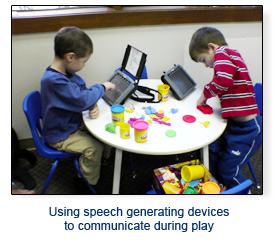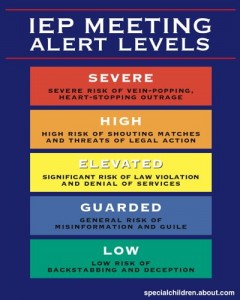When your child has an Individualized Education Program (IEP), he has a support structure within the school. He likely has speech therapy sessions with the school speech-language pathologist (SLP), he may have a one-on-one aide in the classroom, and he may have other accommodations as well. But what happens when he leaves school? As your child grows into a young adult and nears graduation age, you may start to worry about how he’ll handle the outside world with a speech disorder. The Individuals with Disabilities Education Act (IDEA) provides for transition services, which are intended to facilitate independent living and post-secondary education, if applicable.
Using Augmentative and Alternative Communication (AAC) Devices
Speech Therapy TechniquesSpeech disorders can range from problems with articulation to problems speaking any words at all, such as selective mutism. Children who cannot speak at all or those who speak very little have difficulty expressing their basic needs and wants. This can become frustrating for them, which may sometimes result in behavioral issues. One solution is providing your child with an alternative means of communication.
How to Teach the “P” Sound
Speech Therapy TechniquesYour child’s speech-language pathologist (SLP) should provide you with activities to do at home to encourage your child’s progress. If not, ask the SLP for “homework.” If your child needs help with individual sounds, work on helping him master those sounds before moving on to syllables and whole words.
Dispelling Speech and Language Therapy Myths
Language Development Speech DisordersWhen you first begin to research speech therapy and speech disorders, chances are you will come across some misguided information. You might hear that your child will likely grow out of his speech disorder, that you should never use “baby talk” with an infant, or that living in a bilingual household is detrimental to your child’s language development. When in doubt, never hesitate to ask your child’s speech therapist about these issues.
Surviving the IEP Meeting
Individualized Education Program (IEP) Legal IssuesUnder the Individuals with Disabilities Education Act, a child who qualifies for special education requires an Individualized Education Program (IEP). This is a written treatment plan that describes your child’s speech therapy needs and how they will be met within the public school system. After your child is evaluated by an interdisciplinary team of professionals, you will receive a notice for an IEP meeting. During this meeting, the team will discuss your child’s needs and write his IEP if he is eligible for special education.





